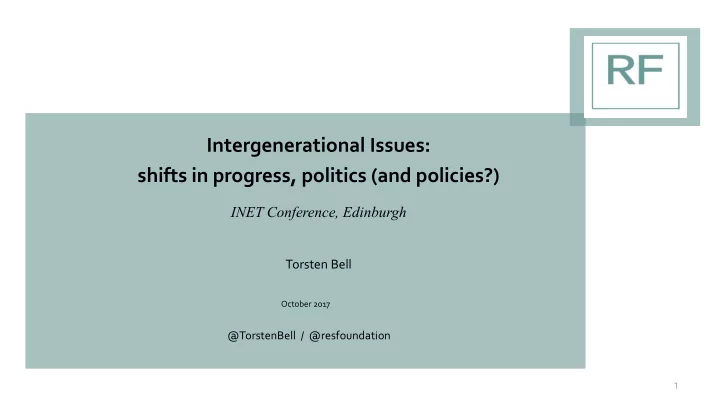

Intergenerational Issues: shifts in progress, politics (and policies?) INET Conference, Edinburgh Torsten Bell October 2017 @TorstenBell / @resfoundation 1
(Relative) social mobility as THE intergenerational debate 2
Intergenerational mobility – everyone’s on about it ‘the only thing that counts is not where you come from but what you are’ (Tony Blair, Prime Minister, 2001) ‘we have strived to deliver equal opportunity — that success doesn’t depend on being born into wealth or privilege, it depends on effort and merit’ (Barack Obama, 2013) 3
Intergenerational mobility – it drove the social investment state • Early years interventions • Parenting support • Deprivation weighted education spend • Higher education participation & access • Family income support/childcare • Asset based welfare 4
A thought experiment on generational progress 5
Thought 1: cohort progress, no social mobility . 6
Thought 2: cohort progress, perfect mobility 7
Thought 3: no cohort progress, perfect mobility 8
Thought 4: who is angriest? 9
Are the times a changin’? 10
This is clearly crisis related – but not just the crisis… Growth in pay at age 25 between successive five-year birth cohorts: Real weekly pay (RPIJ-adjusted), UK 11
And no – this isn’t just Brexit Britain 1 Whether young people will have a better or worse life than their “Will today’s young people will have a better or worse life than their parents?” parents, by country: 2016 Q: To what extent, if at all, do you feel that today’s youth will have a better or worse life than their parents, or will it be about the same? Better Worse Total 39% 40% China 78% 7% Peru 66% 23% India 65% 20% Indonesia 63% 25% Brazil 56% 27% South Africa 49% 39% Mexico 48% 44% Russia 45% 30% Poland 42% 37% Argentina 40% 37% US 39% 39% Turkey 37% 38% Italy 34% 48% Germany 32% 46% Japan 28% 38% Sweden 27% 34% Australia 26% 43% South Korea 24% 58% Great Britain 22% 50% Spain 21% 55% Belgium 15% 60% France 10% 71% Notes: Base of 18,810 adults aged 16+ in 22 countries, fieldwork conducted September-October 2016. Source: Ipsos Global Trends Survey 2017
And no – this isn’t just Brexit Britain 2 Change in real earnings between 2006 and 2014, selected age bands Norway 50 to 59 year olds Sweden Under 30s Netherlands Denmark US Finland Spain Germany Belgium France Italy Portugal UK Greece -30% -25% -20% -15% -10% -5% 0% 5% 10% 15% 20% Source: Eurostat 13
Where for politics and policy? 14
Recognition and division “There is a growing divide between a more prosperous older generation and a struggling younger generation…” Theresa May, July 2016 Which party did you vote for? (2017 General Election, by age-group) 70+ 69% 19% 7% 60-69 58% 27% 7% 50-59 47% 37% 7% 40-49 39% 44% 8% 30-39 29% 55% 8% 25-29 23% 63% 7% 20-24 22% 62% 9% 18-19 19% 66% 9% 0% 10% 20% 30% 40% 50% 60% 70% 80% 90% 100% 15 Source: RF analysis of YouGov, How Britain Voted 2017
Policy shifts? Big picture • Competition vs previous agendas • Existing agenda – new arguments The micro • Revisit who pays for new costs • Life stage or cohort redistribution • Opportunity races – public vs private • The return of inheritance 16
Intergenerational Issues: shifts in progress, politics (and policies?) INET Conference, Edinburgh Torsten Bell October 2017 @TorstenBell / @resfoundation 17
Recommend
More recommend